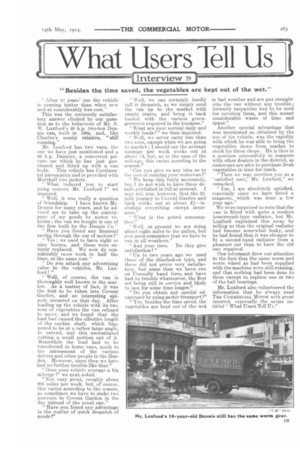What Users Tell Us Interview 29
Page 19

If you've noticed an error in this article please click here to report it so we can fix it.
" Besides the time saved, the vegetables are kept out or the wet."
"After io years' use the vehicle is running better than when new and at considerably less cost."
This was the eminently satisfactory answer elicited by our question as to the behaviour of Mr. 8. W. Luxford's 20 h.p. two-ton Dennis van, built in 1904, and, like Charles's auntly relative, "still running."
Mr. Luxford has two vans, the one we have just mentioned and a 50 h.p. Daimler, a converted private ear which he has just purchased and fitted up with a van body. This vehicle has Continental pneumatics and is provided with Marshall tire jackets.
"What induced you to start using motors, Mr. Luxford 1" we inqu tred.
" Well, it was really a question of friendship. I have known Mr. Dennis for many years, and he advised me to take up the conveyance of my goods by motor vehicles; the van we bought is one of the first built by the Dennis Co."
"Have you found any financial saving through the use of motors?" " Yes ; we used to have eight or nine horses, and these were entirely replaced. We now do considerably more work in half the time, at the same cost."
"Do you attach any advertising value to the vehicles, Mr. Luxford ? "
"Well, of course, the van is thoroughly well known in the market. As a matter of fact, it was the first to be taken into Covent Garden, and an interesting episode occurred on that day. After loading up the vehicle with its two tons of vegetables the van refused to move, and we found that the load had caused the effective length of the cardan shaft, which happened to be at a rather large angle, to extend, and this necessitated cutting a. small portion out of it. Meanwhile the load had to be transferred to horse vans, much to the amusement of the various drivers and other people in the Garden. However, since then we have had no further trouble like that."
"floes your vehicle average. a big mileage ?" we next asked.
" Not very great, roughly about 200 miles per week, but, of course, this varies according to the season, as sometimes we have to make two journeys to Covent Garden in the day instead of the usual one."
"Have you found any advantage in the matter of quick despatch of goods I" " Well, we can certainly hardly call it despatch, as we simply send the van up to the market with empty crates, and bring it back loaded with , the various greengroceries required in the business." " What are your normal -daily and weekly loads ? " we then inquired.
" Well, we never carry less than two tons, except when we are going to market ; I should say the average tonnage per week works out at about 12, but, as in the case of the mileage, this varies aoording to the season."
"Can you give us any idea as to the cost of running your motorvan 7" " We keep this fairly accurately, but I do not wish to have these details published in full at present. I may tell you, however, that the 33mile journey to Covent. Garden and back works out at about eluding everything except insurance."
" What is the petrol consumption 7"
" Well, at present we are doing about eight miles to the gallon, but you must remember that we have to run in all weathers."
" And your tires. Do they give satisfaction?"
'Up to two years ago we used those of the clinched-on type, and these did not prove very satisfactory, but since then we have run on Connolly band tires, and have had no trouble whatsoever, the first set. being still in service and likely to last for some time longer."
"Do you obtain any special advantages by using motor transport?"
"yes besides the time saved, the vegetables are kept out of the wet in bad weather and are put straight into the van without any trouble ; formerly tarpaulins had to be used for covering them, and this meant considerable waste of time and space."
Another special advantage that was mentioned as obtained by the use of his vehicle, was the rapidity with which he was able to bring the vegetables down from market to stock his three shops. He is thus in a position suocessfully to compete with other dealers in the district, as customers are able to purchase fresh vegetables in time for iunch.
"Then we may mention you as a 'satisfied user,' Mr. Luxford," we remarked.
"Yes, I am absolutely satisfied, especially since we have fitted a magneto, which was done a, few year ago."
We were surprised to note that the van is fitted with quite a modern honeycomb-type radiator, but Mr. Luxford explained this away by telling us that the original radiator had become somewhat leaky, and he had found that it was cheaper to fit a second-hand radiator from a plea.sure car than to have the old one repaired.
Our informant drew our attention to the fact that the same worm and worm wheel as had been supplied with the machine were still running, and that nothing had been done to them except to replace one or two of the ball bearings.
Mr. Luxford also volunteered the information that he always read THE COMMERCIAL MOTOR with great interest, especially the series entitled "What -Users Tell Us."


























